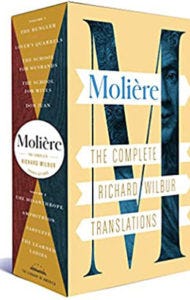Molière, for Love and Laughter
Was the great French comedian—several of whose translated plays are collected in a new Library of America set—a proto-feminist?
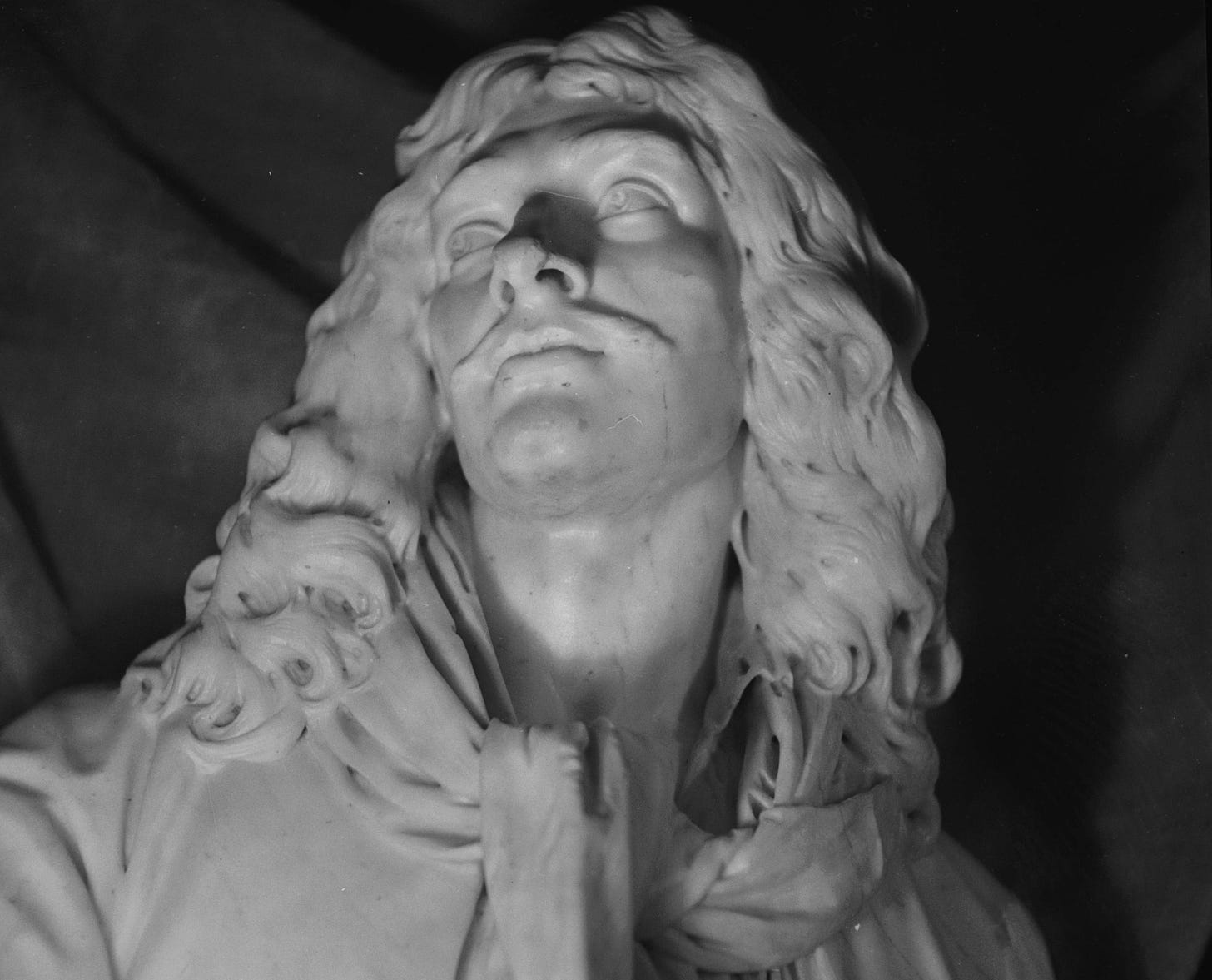
The four-hundredth anniversary earlier this year of the birth of Molière—one of the pillars of French culture and one of the greatest playwrights in the Western literary tradition—was not a date met with great fanfare in the United States. Nonetheless, it was marked with a literary event that deserves ample acclaim: the publication by the Library of America of a two-volume collection of Molière plays exquisitely translated by the great twentieth-century American poet Richard Wilbur (1921–2017).
Molière (1622–1673; real name, Jean-Baptiste Poquelin) could be called France’s Shakespeare if Shakespeare had written only comedies. (One might say that Molière and the great tragedian Jean Racine—whose greatest work, coincidentally, is also available in Wilbur translations—form the French Shakespeare together.) Like Shakespeare, Molière had his own theater company for which he wrote and performed. Like Shakespeare, he left his mark on the language, bequeathing such words as tartufferie—what we might nowadays call virtue-signaling—based on the religious huckster Tartuffe in his most famous play. And he is almost certainly, next to Shakespeare, the world’s most translated author and most produced playwright.
TRANSLATION OFTEN REMAINS a stumbling block to Molière appreciation. His greatest masterpieces, with the exception of Don Juan (which is included in this collection) and The Miser (which, regrettably, is not), are written in the classical form of French verse: alexandrines—that is, couplets of rhyming iambic hexameter (12-syllable) lines. Verse translation that captures the spirit of the original while sticking reasonably close to the text is a devilishly difficult task. Prose or free verse translation won’t do it: the flavor of the original is lost, and the language of formal verse seems stilted and pretentious without rhyme and meter. Some translators have tried to use Shakespearean blank verse—unrhymed iambic pentameter—as a replacement for Molière’s alexandrines; much better, but still inadequate, since rhyme is essential to the stylized quality of Molière’s poetic language. Wilbur’s choice, rhyming couplets of iambic pentameter, is perfect—and he pulls it off very well. (Both volumes of the Library of America collection feature a fine introductory essay by Adam Gopnik discussing the Wilbur translations as part of a “‘return to rhyme’ in American literary culture in the fifties and sixties” and offering a larger defense of rhyme and meter.)
As a sample of Molière/Wilbur virtuosity, here is a gem from The Misanthrope: a short monologue in which one of the characters, Éliante, objects to the cranky hero’s insistence that a genuinely devoted lover must honestly criticize his beloved’s faults.
Love, as a rule, affects men otherwise,
And lovers rarely love to criticize.
They see their lady as a charming blur,
And find all things commendable in her.
If she has any blemish, fault, or shame,
They will redeem it by a pleasing name.
The pale-faced lady’s lily-white, perforce;
The swarthy one’s a sweet brunette, of course;
The spindly lady has a slender grace;
The fat one has a most majestic pace;
The plain one, with her dress in disarray,
They classify as beauté negligée;
The hulking one’s a goddess in their eyes,
The dwarf, a concentrate of Paradise;
The haughty lady has a noble mind;
The mean one’s witty, and the dull one’s kind;
The chatterbox has liveliness and verve,
The mute one has a virtuous reserve.
So lovers manage, in their passion’s cause,
To love their ladies even for their flaws.
The play in which this superb little speech appears—The Misanthrope, written in 1666—is arguably Molière’s greatest masterpiece. While he often paints in broad if brilliant strokes, this play is remarkably nuanced, with a central character who is both ridiculous and sympathetic, even admirable; both a target of satire and a hero of sorts. Alceste is a rebel with a cause, a man disgusted by the falsity, artificiality, and malice of the society that surrounds him—the aristocratic milieu of the heyday of Louis XIV’s reign, when attending to the king at wakeup and bedtime was serious business and most of the remainder of the day was spent in endless socializing, empty romances, and backstabbing. “My one great talent is for speaking plain; / I’ve never learned to flatter or to feign,” declares Alceste. His angry speeches denouncing the ways of the world are meant to have much truth in them, and Éliante, who is a minor character but is clearly meant to be the voice of good sense and decency, insists that his eccentricity has “its noble, heroic side”: “In this false age, such candor seems outrageous; / But I could wish that it were more contagious.”
And yet Alceste is also a ridiculous crank. His denunciations of human turpitude can be comically over the top; the opening scene finds him thundering at his friend Philinte (who is something of a stock Molière character, the Reasonable Friend) for the “base” and “scandalous” crime of effusively greeting a man he barely knows and responding to the fellow’s protestations of friendship with a display of phony enthusiasm. If he ever stooped to such behavior, Alceste fulminates—not joking—“I’d hang myself for shame, without delay.” (Here we sympathize with Philinte when he ripostes, “I hope that you will take it graciously / If I extend myself a slight reprieve / And live a little longer, by your leave.”) After this cantankerous exchange, Alceste points to a lawsuit he’s defending himself against as evidence of the corruption of the age—his victory is far from assured even though he’s clearly in the right, and the plaintiff is welcome everywhere despite being a well-known scoundrel—and then pronounces that he wouldn’t mind losing because that would give him all the proof he needs of humanity’s irredeemable baseness. (When he gets his wish in Act 5, he refuses to appeal, for the same reason.) Alceste’s righteousness easily turns to self-righteousness, his rectitude to posturing, and he commits the common error of thinking he’s being blunt when he’s being a jerk.
To complicate things further, Alceste is in love with a woman who seems to exemplify everything he hates: the young widow Célimène, who is clever and charming but also a fickle flirt, surrounded by a crowd of admirers and always ready to impress them with her malicious wit directed at absent people—including ones from her circle of friends. (In a key scene, Célimène entertains two visitors, both insufferable fops, with nasty character sketches of mutual acquaintances while Alceste seethes, quietly at first.) When Philinte asks Alceste why he won’t turn his attention to Célimène’s cousin Éliante, who seems to have a soft spot for him, Alceste shrugs helplessly: love does not obey reason. In a subsequent scene, he cements his status as an egotistical jerk when, in a rage at Célimène’s apparent betrayal he begs Éliante to accept him as a suitor without even bothering to hide that his motive is revenge. Éliante wisely refuses, predicting that Alceste will promptly forgive the culprit; and indeed, he quickly goes from ragefully demanding an explanation to pathetically begging for some acceptable excuse.
It all ends badly, of course. Célimène is publicly shamed when two of her admirers—those same insufferable fops—compare notes and discover that she has written them practically identical letters declaring her love and trashing all her other suitors. (The only difference between the two letters is that the one to Fop No. 1 trashes Fop No. 2, and vice versa.) After they publicly confront her, the besotted Alceste is still willing to forgive Célimène—but on the condition that she not only marry him but join him in fleeing to “that wild, trackless, solitary place / In which I shall forget the human race.” (He is presumably talking about his country estate, not some dilapidated shack in the wilderness.) Célimène agrees to marriage but not to exile. “No, I detest you now,” declares Alceste and, after morosely wishing happiness to the newly engaged Éliante and Philinte, walks off with the intent to “flee this bitter world where vice is king” and retire to solitude.
Just how much merit there is Alceste’s rebellion against “the world,” and whether we should see him more as a “stubborn child”—in Philinte’s words—or a flawed hero, remains unresolved. That’s a big part of what makes this rather dark comedy so fascinating. (And, of course, as alien as the affectations of seventeenth-century French courtly life seem to us, the play’s central themes of integrity, compromise, sincerity, and fakery are by no means dated.) There is also an interesting ambiguity about Célimène: does she genuinely love Alceste but love social success even more, or is she an utterly soulless coquette who merely wants him for her vanity and amusement? “Her heart’s a stranger to her own emotion,” the perceptive Éliante says of her cousin, leaving the mystery intact.
Along the way, The Misanthrope offers many more delicious treats—from the hilarious dialogue between the two foppish “little marquesses” enamored of their own fine qualities to the matchless catfight between Célimène and her “friend” Arsinoé, who affects a pose of pious prudishness but actually hankers after Alceste and sees Célimène as a rival. Arsinoé arrives on the scene to offer Célimène some blatant concern trolling (as we would say nowadays) “about the status of [her] reputation”: “some virtuous folk” she saw the other night were decrying Célimène’s brazen and unseemly conduct. (Of course, she adds, “I came to your defense as best I could.”) Célimène, giving as good as she gets, delivers a brilliant rejoinder, telling Arsinoé that she too just happens to have heard some fine people talk about her and take a dim view of her pretend piety:
She prays incessantly; but then, they say,
She beats her maids and cheats them of their pay;
She shows her zeal in every holy place,
But still she’s vain enough to paint her face;
She holds that naked statues are immoral,
But with a naked man she’d have no quarrel.
As the coup de grâce, Célimène ends her monologue by repeating Arsinoé’s own conclusion to her word for word:
Madam, you’re too intelligent, I’m sure,
To think my motives anything but pure
In offering you this counsel—which I do
Out of a zealous interest in you.
You can see why this would never work in prose.
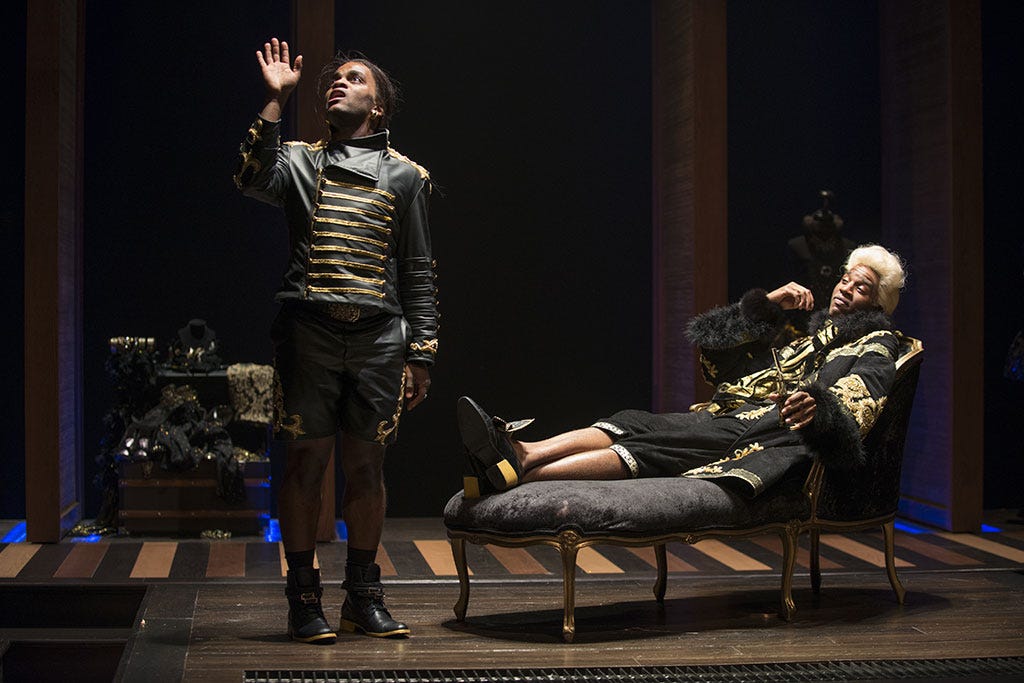
TARTUFFE DOES NOT HAVE The Misanthrope’s moral grays: The title character is an utterly loathsome con man who wears a pious mask while coveting his benefactor’s money, daughter, and wife. But it still has plenty of depth; in some ways the most interesting character in the play is Tartuffe’s dupe Orgon, who is clearly a decent man yet is easily seduced and flattered by Tartuffe’s promise of spiritual perfection—and evolves into a domestic tyrant under the huckster’s guidance. (In his introductory notes, Wilbur suggests that Orgon, a middle-aged man with a young, beautiful wife and two grown children from a first marriage, latches on to Tartuffe because he feels so insecure about his authority in the household; the explanation rings true.)
The other characters are finely sketched, particularly Orgon’s wife Elmire, a sensible woman who humors her deluded husband but is anything but a pushover, and who smartly uses her feminine wiles to entrap Tartuffe by pretending to welcome his advances. Meanwhile, Orgon’s tyrannical mother, Madame Pernelle, is even more deluded about Tartuffe than her son: When a finally undeceived Orgon tells her he literally watched Tartuffe try to cuckold him, the old lady insists that it can’t be true and finally suggest that he “should have waited, to see how things turned out.” Another standout is the maid, Dorine, whose sparkling dialogue transcends the “sassy maid” stereotype. The result is a wonderfully dynamic tableau of deception, self-deception, and fake virtue. It is an ever-relevant tale: In a modern setting, Tartuffe—who, according to Orgon, “can detect / A mortal sin where you would least suspect” and who is always ready to castigate himself as a vile sinner—could be anything from a conservative evangelical to a social justice activist.
While Tartuffe’s religion is pure fraud, Orgon’s piety is undoubtedly sincere—and a reminder of how easily even sincere pieties can turn to self-righteousness and gullibility. When Orgon gushes about the wonderful effect Tartuffe has had on him, the results come across as disturbing rather than inspiring:
Yes, thanks to him I’m a changed man indeed.
Under his tutelage my soul’s been freed
From earthly loves, and every human tie:
My mother, children, brother, and wife could die,
And I’d not feel a single moment’s pain.
(“That’s a fine sentiment, Brother; most humane,” retorts his brother-in-law, Cléante, here cast in the Reasonable Friend role.)
Tartuffe is a rather dark story in its own way, despite a happy ending. The con man, who has gotten Orgon to sign a deed gifting him all his property and to confide a secret that can send him to prison—an association with a political fugitive—almost wins despite being exposed. What saves the day is the offstage intervention of the Solomon-like Sun King, whose officer turns the tables at the last minute and arrests Tartuffe himself instead of Orgon. (A recent New York production democratically but anachronistically reassigns the role of “the Prince” to “the People.”) It’s a bit deus-ex-machina, of course; on the other hand, given that Tartuffe is exposed as a career criminal when he takes legal action against Orgon, one could say that his downfall is the logical outcome of his arrogance and overreach.
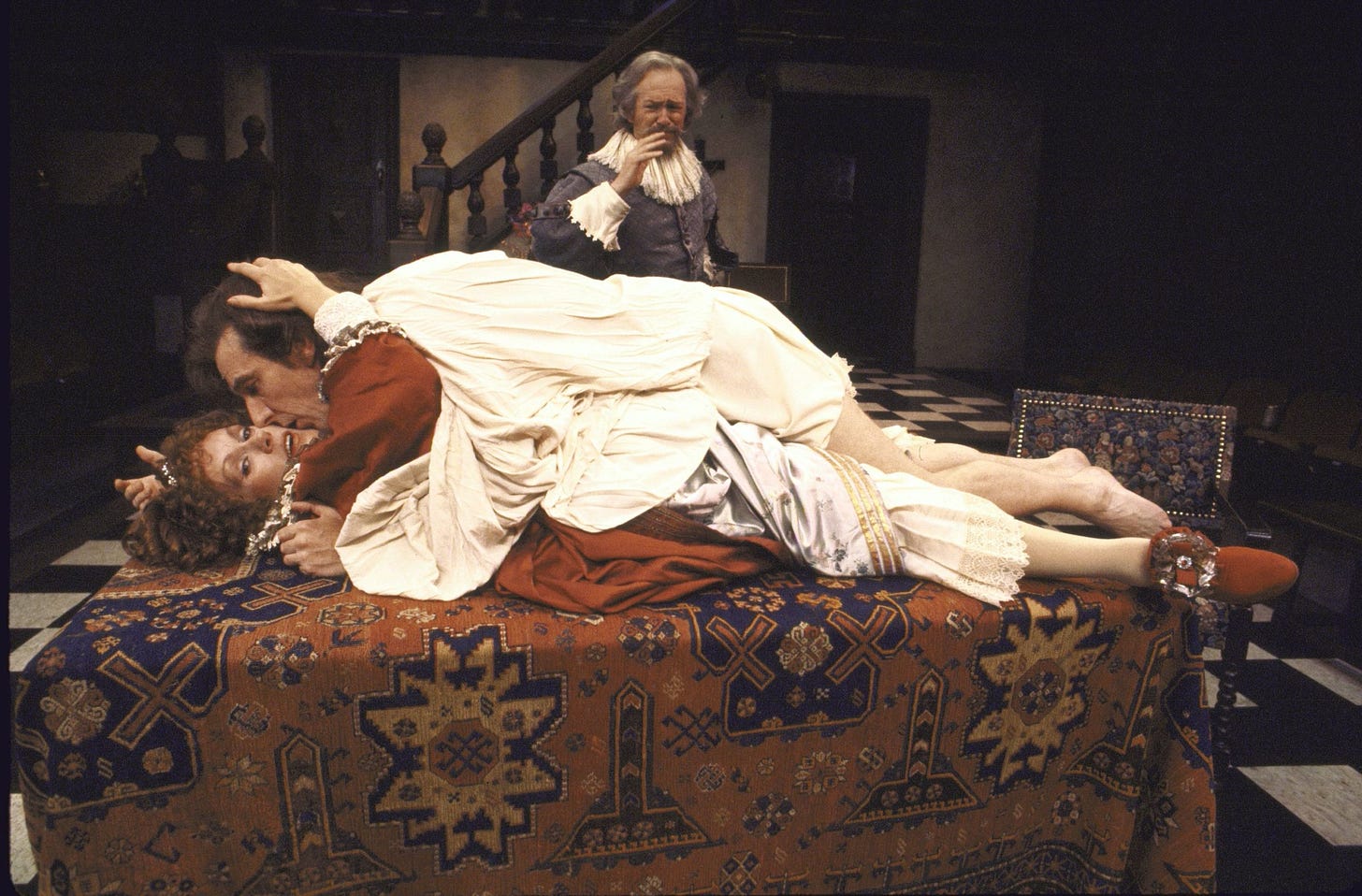
THERE HAS BEEN A TENDENCY for some time to dismiss the classics as the legacy of Dead White European Males. But while Molière is indeed dead and white and European and male, anyone criticizing him on those grounds will have to grapple with the fact that he is the author of one of the world’s earliest feminist works of literature: the 1662 play The School for Wives. Its protagonist, the wealthy bourgeois Arnolphe, is so obsessed with the fear of cuckoldry (a recurring theme in Molière’s plays) that he decides to safeguard himself by customizing his own perfectly submissive wife: spotting a pretty and meek four-year-old girl while passing through a village, he persuades her mother to let him take the child as his ward and has her raised in a convent, with strict instructions to the nuns to keep her simple and ignorant. (“And there are four things only she must know: / To say her prayers, love me, spin, and sew,” Arnolphe boasts to his skeptical Reasonable Friend Chrysalde.) Now 16, the girl, Agnès, has been taken out of the convent and brought to a small house Arnolphe keeps on the outskirts of Paris until they can be married.
Unfortunately (or fortunately), Arnolphe’s plan quickly develops a hitch: Returning from a trip, he learns that, in his absence, Agnès has been seeing a young man, Horace. What’s more, she was tricked into receiving him through the very innocence that has so delighted Arnolphe: When an old woman tells Agnès that Horace has been “wounded” by her eyes while watching her on the balcony and will die unless he spends time with her, the girl takes it quite literally and readily agrees. (In one of Molière’s funniest scenes, an agitated Arnolphe tries to find out if Horace did anything more than kiss Agnès’s hands, while fending off the girl’s natural curiosity about what “other things” people do. At one point, the flustered Agnès stammers, “He took my—oh, you’ll have a fit” and can’t bring herself to finish the sentence while Arnolphe is about to spontaneously combust. Finally, the mystery is revealed: “He took the pretty ribbon that you gave me.” Contemporaries thought the sexual innuendo was shocking.)
It quickly turns out that (1) Agnès and Horace are genuinely in love and (2) Agnès isn’t the meek dummy Arnolphe thinks she is; ordered to chase Horace away by throwing a rock at him from the window, she manages to get him a message by wrapping a letter around the rock. (“Behold what scribbling leads to! It was quite/Against my wishes that she learned to write,” grumbles Arnolphe when he learns about the trick.) The twist: Horace, whose father is an old friend of Arnolphe’s, has no idea that Arnolphe is Agnès’s despotic guardian (there’s a mix-up involving a name change that requires some willing suspension of disbelief) and enthusiastically confides in him about his romance and his plans. The other twist: everything Arnolphe does to thwart that romance backfires and brings the young people closer together.
Of course, comedies in which young lovers thwart the tyranny of parents or guardians are a dime a dozen. (In this case, the plot is resolved by a device that goes all the way back to ancient Roman comedy: a long-lost rich father who comes back to reclaim Agnès as his daughter and arrange her marriage to Horace.) But in The School for Wives, this plot revolves specifically around patriarchal dominance and Agnès’s rebellion against it. Arnolphe sternly harangues his intended bride about a wife’s duty of absolute obedience to her husband and makes her read from a book of maxims about the proper behavior of a married woman (no parties, no elegant clothes or make-up, no guests, no writing, etc.). Agnès, her eyes newly open, bristles with anger at the tyranny and ignorance to which she has been subjected. Near the end of the play, when Arnolphe reminds her of her “obligations” to him because he took care of her upbringing, she fires back:
Yes, that you did. I’m deeply obligated.
How wondrously you’ve had me educated!
Do you fancy that I’m blind to what you’ve done,
And cannot see that I’m a simpleton?
Oh, it humiliates me; I revolt
Against the shame of being such a dolt.
What’s more, Horace too is outraged not only by the fact that his beloved’s despotic guardian is keeping her from him, but by her oppression. Charmed by Agnès’s artless but deeply moving letter, he asks Arnolphe:
And is it not a crime of the basest kind
For anyone to stifle such a mind,
To starve so fine a spirit, and to enshroud
In ignorance a soul so well-endowed?
Obviously, Agnès isn’t demanding to go to the university, only to marry the man she loves and have the kind of education and social life available to young women from the affluent classes at the time; but there is also no doubt that, after listening to Horace and to Arnolphe, she knows enough to see that marriage to Arnolphe will be a prison and marriage to Horace will be liberating.
The School for Wives is unquestionably one of Molière’s best works, not only for its fairly revolutionary treatment of female freedom but also for its character depth and its comedic brilliance. (A brief scene in which a distraught Arnolphe is talking to himself while the notary he called earlier to discuss his marriage thinks Arnolphe is addressing him and tries to answer is laugh-out-loud funny.) Agnès is one of Molière’s best portrayals of young women; and the mostly odious Arnolphe gains a small measure of sympathy when he genuinely despairs at losing a girl he’s just realized he actually loves, in his own way. I do mean small, though: When Arnolphe momentarily thinks he won by persuading Horace’s father to force Horace to marry a rich heiress, Arnolphe is so viciously smug that the sympathy evaporates—and the revelation that the heiress is none other than Agnès herself feels like a very well-deserved comeuppance.
Incidentally, The School for Wives may also be the first work of literature to feature a plot device involving a relative from America, from where Agnès’s father has just returned after rebuilding his fortune for fourteen years.
Those who see Molière as a proto-feminist may be grievously disappointed by his play The Learned Ladies (1672), also a part of the Wilbur collection. Its savage satire is directed at a trio of rich middle-class women with intellectual aspirations led by the imperious Philaminte, whose husband Chrysale—one of the play’s good guys—delivers a positively Arnolphean monologue on the madness of women seeking knowledge. But this isn’t about Molière doing a volte-face and upholding the patriarchy. His mockery is not directed at female intellect but at intellectual humbug: Philaminte’s mentor, the poet Trissotin, is a pretentious fraud. What’s more, in The Learned Ladies, it’s Philaminte who stands for domestic tyranny, trying to force her daughter Henriette (who is smart but uninterested in being an intellectual) to marry the awful Trissotin much as Tartuffe’s Orgon tries to make his daughter marry Tartuffe. Chrysale—whose militant hostility to book-learning in general is certainly not shared by Molière—is a good guy insofar as he supports young love, and his daughter’s marriage to her chosen partner. Indeed, his attempts to assert his patriarchal authority against his wife are so comically inept that the housemaid has to come to his defense.
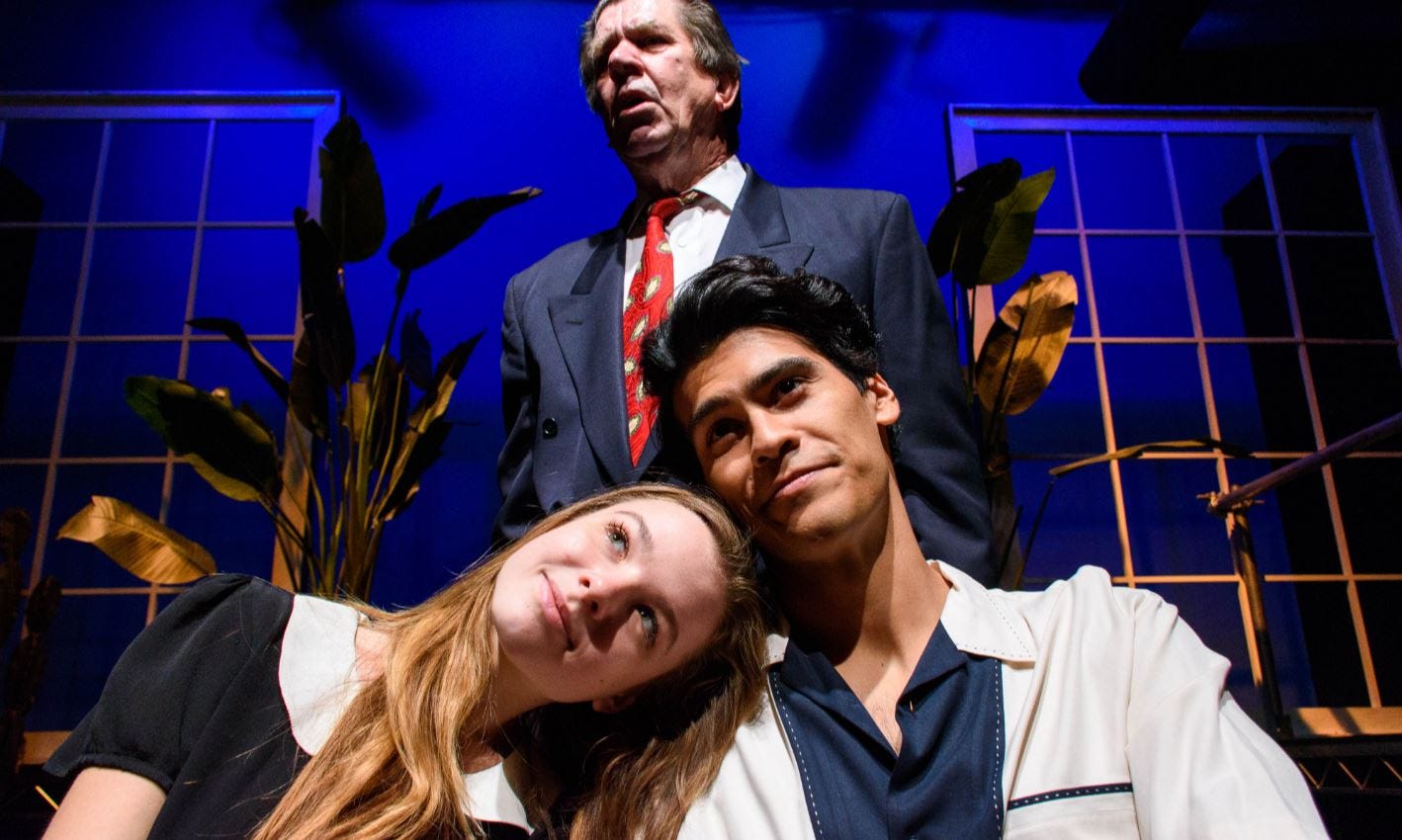
ALSO WORTHY OF NOTICE is the only prose piece in the collection, Don Juan, a play so controversial for its hero’s militant atheism—“I believe that two and two are four, Sganarelle, and four and four are eight,” the Don tells his servant—that an uncensored version of the text was not published until the nineteenth century. (In a particularly shocking scene, Don Juan urges a beggar to blaspheme if he wants alms; when the beggar refuses, Don Juan gives him the money anyway “for the love of humanity.”) Molière’s attitude toward his antihero is complicated: he clearly disapproves of the Don’s obsessive womanizing and shabby treatment of women, but his bravery and defiance are also clearly presented as admirable. While Don Juan meets his usual end at the marble hand of the Commander’s statue, the punishment of the sinner is not treated very reverently: the final lines have a disconsolate Sganarelle lamenting, “Alas, my wages! My wages! Who’ll pay me my wages?” Don Juan may also be of particular interest to opera lovers who will find that some chunks of the text migrated almost intact into Lorenzo Da Ponte’s libretto for Mozart’s Don Giovanni; a sequence in which Don Juan romances a peasant girl named Charlotte and persuades her to ditch her fiancé Pierrot has a very strong resemblance to the Don Giovanni/Zerlina/Masetto storyline in the opera (except that Molière’s version has a second village girl, Mathurine, whom Don Juan is trying to seduce at the same time).
In addition to the masterworks, the Library of America set includes three early Molière works: The Bungler, Lovers’ Quarrels, and Sganarelle, or The Imaginary Cuckold. These comedies certainly don’t approach the depth the mature Molière; they mainly revolve around mishaps and misunderstandings that strain credulity to a lesser or greater degree (in Lovers’ Quarrels, for instance, a man is completely unaware that his 20-year-old son is actually a daughter, passed off as a boy in infancy because the family needed a male child to collect an inheritance). But they are still eminently readable, with witty dialogue and lines that anticipate some of the playwright’s later themes—including proto-feminism, when Sganarelle’s wife in The Imaginary Cuckold complains about cheating husbands and exclaims: “O for a law that would allow us women / To change our husbands as we change our linen!”
Several of Wilbur’s Molière translations, which date from the 1950s through the 2000s, have become accepted as the standard English-language translations. This collection is likely to further secure their place as true American classics. As for Molière, his status is already secure no matter how the canon evolves or gets questioned: His plays appear frequently in the repertory of American theaters. Indeed, New York’s Shakespeare in the Park program was recently supplemented by Molière in the Park, an annual production in Prospect Park, Brooklyn. It has just finished a run of The Misanthrope.





